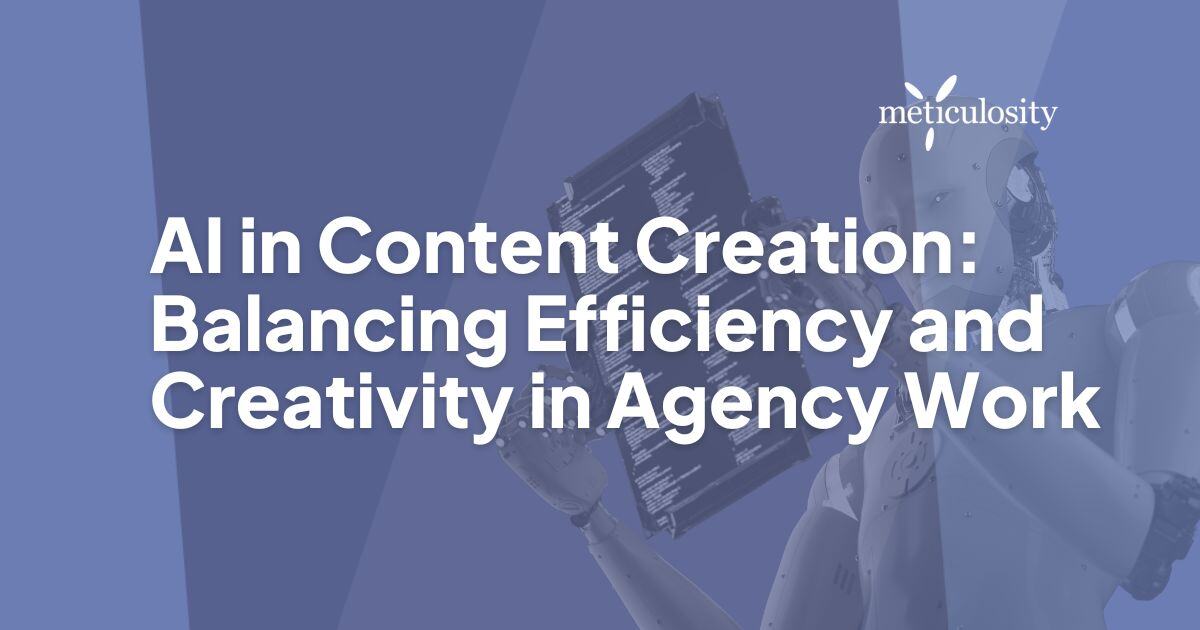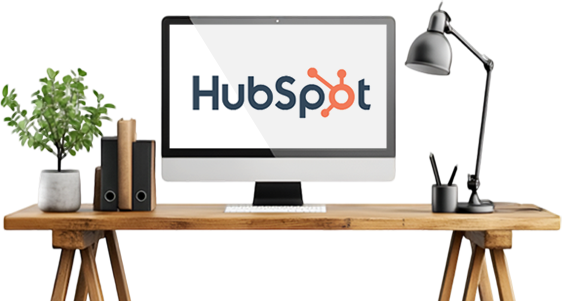Artificial Intelligence (AI) has become an indispensable tool in the content creation landscape. Agencies are leveraging AI-powered tools to generate ideas, streamline workflows, and enhance efficiency. However, as AI takes on a more prominent role, a key question arises: How can agencies maintain a balance between efficiency and creativity? While AI excels in automation and data-driven insights, human expertise remains crucial for crafting compelling, emotionally resonant content. In this blog, we’ll explore how agencies can integrate AI into their content strategies while preserving the creative essence that defines their brand.
Looking to enhance your agency’s content creation with AI? Discover how AI-powered automation can transform your processes with Meticulosity’s Agency Automation.
The Rise of AI in Content Creation
The rapid evolution of AI has transformed the way agencies approach content marketing. Tools like ChatGPT, Jasper, Grammarly, and MidJourney are revolutionizing everything from copywriting and graphic design to video production. AI can generate blog outlines, optimize SEO, suggest social media captions, and even create personalized email campaigns. This level of automation allows agencies to scale their content production while maintaining consistency across multiple platforms. However, while AI brings efficiency, it also raises concerns about originality and authenticity.
Efficiency Gains: How AI Streamlines Content Production
One of AI’s biggest strengths is its ability to handle repetitive tasks quickly and accurately. Agencies can use AI for:
- Automated Research: AI tools scan vast amounts of data to extract key insights, reducing research time significantly.
- SEO Optimization: AI-powered platforms analyze search trends and suggest high-performing keywords to boost rankings.
.jpg?width=663&height=398&name=Efficiency%20Gains%20How%20AI%20Streamlines%20Content%20Production%20(2).jpg)
- Content Personalization: AI can tailor content for different audience segments based on behavior and preferences.
- Automated Editing and Proofreading: Tools like Grammarly and Hemingway improve readability and ensure grammatical accuracy.
- Social Media Scheduling and Analysis: AI-powered platforms like Buffer and Hootsuite optimize post timing and content performance.
By automating these tasks, agencies free up time to focus on strategy and storytelling, improving overall efficiency.
The Creativity Challenge: Maintaining a Human Touch
While AI-generated content is fast and data-driven, it often lacks the emotional depth and nuance of human-created content. Creativity in marketing goes beyond structuring words; it involves storytelling, brand voice, and emotional connection. Here are some key areas where human involvement remains crucial:
- Brand Personality: AI lacks the ability to craft unique brand voices and experiences that resonate deeply with audiences.
- Emotional Intelligence: AI-generated content may miss cultural nuances, humor, or the human emotions that make content engaging.
- Strategic Thinking: AI can provide suggestions, but human marketers must make the final decisions based on brand objectives and audience engagement.
To maintain creativity, agencies should use AI as an enhancement rather than a replacement, ensuring content retains its authenticity and emotional impact.
4. Striking the Right Balance: AI + Human Collaboration
To achieve the perfect blend of AI efficiency and human creativity, agencies should:
- Use AI for Content Ideation: Let AI generate topic ideas and outlines but allow human writers to refine and personalize them.
- Automate Editing, Not Writing: AI can assist in proofreading and grammar checks, but storytelling should be human-led.
- Enhance Data-Driven Decision-Making: AI can analyze audience behavior, but humans must interpret data to create compelling narratives.
- Maintain Final Creative Control: AI can generate drafts, but the final touches, tone adjustments, and brand alignment should be handled by humans.
By using AI as a support system rather than a replacement, agencies can maintain a creative edge while optimizing productivity.
Ethical Considerations and AI Content Governance
With AI-generated content on the rise, agencies must consider ethical implications such as:
- AI Bias and Accuracy: AI systems may perpetuate biases present in their training data, leading to problematic content.
- Misinformation Risks: AI can generate misleading or factually incorrect content if not carefully monitored.
- Transparency and Disclosure: Agencies should disclose AI-assisted content creation when necessary to maintain trust.
- Intellectual Property Concerns: AI-generated content may raise questions about copyright and originality.
Setting ethical guidelines and ensuring human oversight can mitigate these risks while maintaining brand credibility.
Choosing the Right AI Tools for Your Agency
Selecting the right AI tools depends on an agency’s specific needs. Here are some key tools to consider:
- Writing & Editing: ChatGPT, Jasper, Grammarly, Hemingway
- SEO & Content Optimization: Clearscope, Surfer SEO, Frase
- Social Media Management: Buffer, Hootsuite, Lately
- Design & Visuals: MidJourney, Canva’s AI features, Adobe Firefly
- Video Creation: Synthesia, Descript
When integrating AI tools, agencies should test their effectiveness, ensure alignment with brand voice, and continuously refine their approach.
Future Trends: Where AI and Content Creation Are Headed
AI in content creation is constantly evolving, with emerging trends including:
- More Sophisticated AI Writing Models: AI-generated content will become more natural and contextually relevant.
- AI-Powered Video & Voice Generation: Advances in AI-generated videos and voiceovers will transform multimedia content.

- Hyper-Personalization: AI will refine content customization based on real-time audience behavior.
- AI-Driven Visual Storytelling: AI will play a bigger role in graphic and video content creation.
As AI tools continue to advance, agencies will need to adapt and innovate while maintaining human creativity at the core of their content strategies.
Conclusion
AI is transforming content creation, enabling agencies to work faster and smarter. However, true success lies in balancing AI’s efficiency with human creativity. By using AI as a tool rather than a crutch, agencies can enhance productivity while maintaining the originality and emotional impact that make content truly engaging. As AI continues to evolve, agencies that master this balance will be best positioned to deliver compelling, high-quality content that resonates with audiences.
Want to leverage AI-powered automation in your agency? Learn how with Meticulosity’s Agency Automation.
Frequently Asked Questions
1. Can AI completely replace human content creators?
No, AI can assist with efficiency and optimization, but it lacks human creativity, emotional intelligence, and strategic storytelling abilities. The best approach is human-AI collaboration.
2. What are the risks of relying too much on AI for content creation?
Over-reliance on AI can lead to generic, repetitive content that lacks originality and brand voice. It may also introduce biases or factual inaccuracies.
3. How can agencies ensure AI-generated content is high quality?
Agencies should use AI as a starting point while maintaining human oversight. Fact-checking, refining tone, and ensuring alignment with brand strategy are essential steps.
4. What types of content can AI generate effectively?
AI is highly effective for blog outlines, SEO analysis, social media captions, email drafts, and basic copywriting. However, human input is needed for deep storytelling and creative campaigns.
5. What’s the best way to integrate AI into an agency’s workflow?
Start by using AI for research, editing, and automation while keeping humans in charge of strategy, creativity, and final content approval. Choose tools that align with your agency’s needs.







